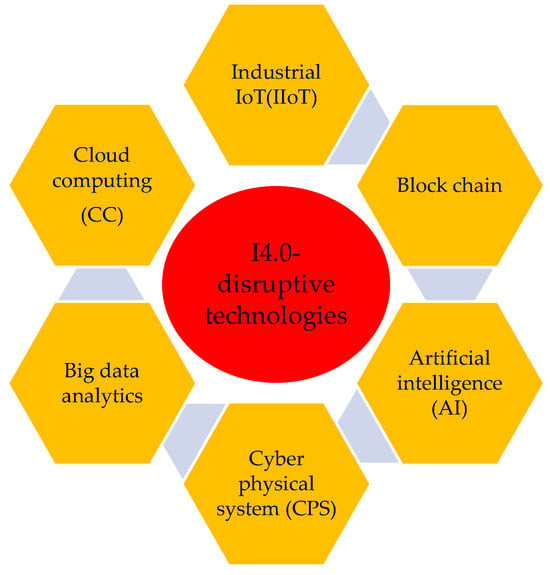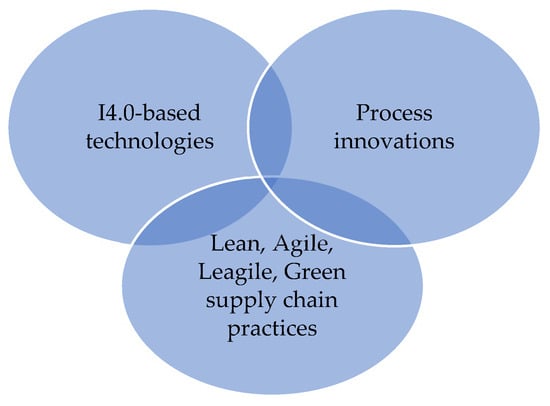You're using an outdated browser. Please upgrade to a modern browser for the best experience.
Please note this is a comparison between Version 1 by MOHAMED RAFIK NOOR MOHAMED QURESHI and Version 2 by Lindsay Dong.
Supply chain management (SCM) is seen as strategically important for boosting organizational performance and better achieving organizational objectives like higher profitability, improved customer service, and increased competitiveness.
- green supply chain
- Industry 4.0
- supply chain
1. Introduction
The term ‘Industry 4.0’ (I4.0) marks the new paradigm of internet-based technologies as a fourth industrial revolution in all production and service-related activities. I4.0 symbolizes the global network of smart machine networks in a smart industry dealing in the exchange of information and control of each other in real time [1]. The impact of I4.0-based technologies on a supply chain becomes crucially important to understand the effect of these technologies on the supply chain (SC) stakeholders, i.e., suppliers, manufacturers, and customers. I4.0 technologies are playing a vital role in enhancing the quality and value of a process and product throughout their manufacturing cycles, making manufacturers competitive in local and global markets. I4.0 technologies lead to sustainable manufacturing practices involving constant updates in skills, knowledge, and technology from SC stakeholders [2]. Further, the integration of I4.0 technologies and SC activities has become a competitive necessity in most industries [3].
Supply chain management (SCM) is seen as strategically important for boosting organizational performance and better achieving organizational objectives like higher profitability, improved customer service, and increased competitiveness [4]. A good supply chain (SC) strategy can offer the necessary components for success in an environment that is becoming more competitive. Consequently, there is a desire to increase delivery efficiency, adaptability, quality, and cost effectiveness from an SC perspective while maintaining market competitiveness, which can be dealt with by pursuing efficient and adaptable procedures under an SC strategy [5]. In today’s highly competitive environment, I4.0 technologies, sustainability, and coordination are becoming increasingly crucial [6]. Manufacturing companies can achieve sustainable competitiveness in the global market by maintaining an efficient manufacturing SC [7]. Sustainability in a manufacturing SC acts as the backbone vital to remaining competitive in the market [8][9][8,9]. Sustainability through economic, technological, and societal innovation can help manufacturers survive the industry’s competition. The technology change has helped all manufacturers overcome manufacturing defects and achieve the best quality possible. Hence, the product manufactured using the same manufacturing setup almost exhibits the same quality, making it difficult for manufacturers to fight the competition relying on only quality attributes. The manufacturers adopt the new technology to be the first to launch the product and earn the maximum possible profit. The sudden technology-based disruption due to new technologies has pressured the manufacturing sector to change their ongoing manufacturing technology to be on par with I4.0 norms. The need of the day for the manufacturers is to adopt suitable new technology, as given in Figure 1, with a good strategic vision that may help in achieving sustainability in the value chain [10]. Sustainable manufacturing methods can offer businesses a competitive edge by resulting in eco-friendly products and processes [11].

Figure 1.
I4.0-disruptive technologies.
I4.0 technologies such as additive manufacturing, collaborative robots, visual computing, and cyber-physical systems (CPS) help in manufacturing connectivity with stakeholders. The ongoing acceptance of I4.0 technologies such as IoT and CPS in the manufacturing SC enables its stakeholders to reap the benefits of information sharing at all levels in real time with product advancement for increased benefits. Using I4.0 technology, several constraints such as unpredictability, cost escalation, and SC complexity can be solved. Nowadays, the manufacturing SC needs to be transformed to be smarter to bridge manufacturing infrastructure with customers and stakeholders using the process in [12]. CC helps in information sharing among SC partners for the betterment of SC performance [13]. Data capture, either from service or manufacturing sectors, is rapidly growing to make big data favourable for the effective management of the manufacturing SC [14]. SC performance is enhanced using blockchain technology by minimizing the negative consequences of information asymmetry [15]. Artificial intelligence (AI) in manufacturing SC helps automate the system with robust, optimized cycle time-oriented, error-free, and waste-free production lines [16].
Process innovation (PI) is a paradigm shift in product manufacturing to shorten the production lead time in a manufacturing SC. PI encompasses the new or potentially changed production process to meet the customer’s needs innovatively, either through radical changes in technologies, machines, equipment, or software [17]. Cost effectiveness is the prime goal of PI, which offers a manufacturing company a cutting edge to fight cutthroat competition. Manufacturers have attempted PI in search of profit and to cut down on waste. I4.0 technologies, such as automated guided vehicles, 3D printing, and robotics, enable businesses to cut down on resource waste and emissions, improving the environment overall and lowering the marginal cost of manufacturing [18]. The resource utilization of 7M (men, machine, money, material, method, matrix, and management) is an essential decision-making process in sustainable manufacturing processes. Technology adoption, along with the right decision-making, may help in optimizing resources and may lead to a reduction in harmful environmental effects [19].
The good performance of the manufacturing SC exhibits market sensitivity in SC integration [20]. There are several types of SC practices in the manufacturing sector for different products. I4.0 technologies help such SCs prompt decision making throughout the SC partners by accelerating the material, financial, and information flows. The various SC practices are leagile supply chain (LEASC), agile supply chain (ASC), lean supply chain (LSC), green supply chain (GSC), etc. I4.0 technologies have various impacts on SC practices; for instance, big data analytics (BDA) and IoT influence lean practices, whereas agile practices are impacted by CC and CPS [21]. SC strategies play a significant role in performance improvement; however, research revealed that I4.0 base technologies do not have the same effects on lean and agile SC strategies [22]. I4.0 technologies help manufacturing units cut down on wasted resources and emissions, leading to environmental benefits as well as a reduction in marginal production costs [18]. The improvement in various manufacturing SCs makes it capable of fulfilling the changes in customer needs with the most effective cost solution in the most sensitive market. In an LSC, everything revolves around supplying a product to the consumer as quickly and waste-free as possible; thus, the amalgamation of lean with I4.0 technologies will boost speed, productivity, and autonomous operations [23]. In an SC, leanness boosts profits by cutting expenses, but agility increases profits by satisfying user needs. The cost-effectiveness of material management in each SC is made possible by an LSC. The LSC also allows product distribution the achievement of high service levels in a dynamically changing market.
2. Sustainable Manufacturing Supply Chain
In the manufacturing sector, SCM plays an important role in fulfilling the customer’s demand by adopting strategic managerial practices like planning, directing, organizing, and controlling. The various functions like sourcing, material supply, outsourcing, manufacturing, constructing the required assembly, managing inventories, and warehouse management to manage the final product deliveries at an optimum cost help in managing the manufacturing SC. For various SC activities to meet demand and supply, manufacturing enterprises must implement I4.0 technologies that result in PI and lead to the improvement of SC performance [22].
To respond to rapid changes in supply and demand, ASC takes process effectiveness, flexibility, and responsiveness into account and authorizes employees for prompt and timely decision making. Many a time, part or product availability becomes the most important aspect in fulfilling an order; hence, a strategic move towards ‘quick response’ becomes very significant and leads to an ASC. The cost involved in meeting demand and supply makes it important to use lean, agile, and league, and sometimes green initiatives are required. Figure 2 shows the SC integration with I4.0 technologies leading to PI. The firms can gain higher performance by adopting I4.0-based technologies in their SC activities and integrating them with PI [24]. I4.0 technologies help in accomplishing SC activities that lead to effective outcomes and exhibit good and timely decision making. Various SCs receive benefits from fulfilling timely deliveries for sustainable supply chain management (SSCM).

Figure 2.
Supply chain integration with I4.0 technologies and PI.
A study revealed that SC activities enabling visibility and scalability are significantly impacted by I4.0 technologies [21]. Despite I4.0 technology having a varying rate of influence on organizational processes, it has the potential to influence lean and agile SCM. The processes involved in lean and agile SCM practices are greatly influenced by I4.0 digital technologies. Utilizing SC dynamics, a conceptual model was put forth to explore the ways in which lean and green practices affect SC performance [25].
I4.0 technology such as CPS is vital in manufacturing SC for connectivity and transparency through machine integrations with SC using BDA, CC, and IoT. A study was carried out to investigate the CPS for performance monitoring, and the study found a positive effect on intralogistics activities [26]. A study based on data analysis from 303 U.S. manufacturing managers using covariance-based structural equation modelling methodology (CB-SEM) revealed that IIoT achieves greater agility along with blockchain [27]. A study based on 520 South African mining executives used SEM-PLS and revealed that BDA improves sustainable supply chain outcomes [28].
